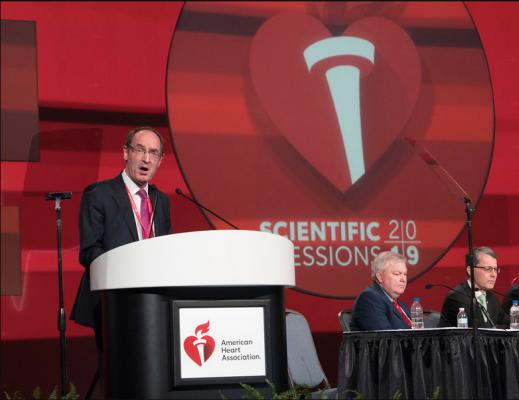
John McMurray, M.D., presenting the DAPA-HF Trial at AHA 2019 last November. It was part of the late-breaking presentations in the "Outside the Box: New Approaches to CVD Risk Reduction" session. Photo by AHA/Phil McCarten
May 6, 2020 — The U.S. Food and Drug Administration approved AstraZeneca’s dapagliflozin (Farxiga) oral tablets for adults with heart failure with reduced ejection fraction (HFrEF) to reduce the risk of cardiovascular death and hospitalization for heart failure.
The dapagliflozin is the first in a new drug class of sodium-glucose co-transporter 2 (SGLT2) inhibitors to be approved to treat adults with New York Heart Association’s (NYHA) functional class II-IV heart failure with reduced ejection fraction (LVEF at or less than 40 percent).
“Heart failure is a serious health condition that contributes to one in eight deaths in the U.S. and impacts nearly 6.5 million Americans,” said Norman Stockbridge, M.D., Ph.D., director of the Division of Cardiology and Nephrology in the FDA’s Center for Drug Evaluation and Research. “This approval provides patients with heart failure with reduced ejection fraction an additional treatment option that can improve survival and reduce the need for hospitalization.”
The FDA approval was based on positive results from the Phase III DAPA-HF trial, which showed dapagliflozin achieving a statistically significant and clinically meaningful reduction of CV death or hospitalization for heart failure, compared to placebo. The decision follows the Priority Review designation granted by the FDA earlier this year and the Fast Track designation granted in September 2019.
Dapagliflozin was shown in a clinical trial to improve survival and reduce the need for hospitalization in adults with heart failure with reduced ejection fraction. Farxiga’s safety and effectiveness were evaluated in a randomized, double-blind, placebo-controlled study of 4,744 participants. The average age of participants was 66 years and more participants were male (77 percent) than female. To determine the drug’s effectiveness, investigators examined the occurrence of cardiovascular death, hospitalization for heart failure, and urgent heart failure visits. Participants were randomly assigned to receive a once-daily dose of either 10 milligrams of Farxiga or a placebo (inactive treatment). After about 18 months, people who received Farxiga had fewer cardiovascular deaths, hospitalizations for heart failure, and urgent heart failure visits than those receiving the placebo.
“The ground-breaking results of the DAPA-HF trial have transformed heart failure therapeutics. Today’s approval provides physicians with a completely novel pharmacological approach that greatly improves outcomes for patients with heart failure with reduced ejection fraction,” said John McMurray, M.D., Cardiovascular Research Centre, Institute of Cardiovascular and Medical Sciences, University of Glasgow, U.K.
The DAPA-HF trial showed that the drug, in addition to standard of care, reduced the risk of the composite outcome of CV death or the worsening of HF versus placebo by 26 percent (absolute risk reduction [ARR] = 5 percent [event rate/100 patient years: 11.6 vs 15.6, respectively]; p<0.0001) in patients with HFrEF. During the trial duration, one CV death or hospitalization for HF or an urgent visit associated with HF could be avoided for every 21 patients treated with dapagliflozin.
The safety profile of Farxiga in the DAPA-HF trial was consistent with the well-established safety profile of the medicine. The data from the DAPA-HF trial were published in The New England Journal of Medicine.[1]
In October 2019 the U.S. FDA approved dapagliflozin to reduce the risk of hospitalization for HF in adult patients with T2D and established CV disease or multiple CV risk factors. The approval was based on the DECLARE-TIMI 58 trial.[2]
Dapagliflozin is also indicated as an adjunct to diet and exercise to improve glycemic control in adults with T2D.
Indications and Limitations of Dapagliflozin
Farxiga is indicated by the FDA for:
• As an adjunct to diet and exercise to improve glycemic control in adults with type 2 diabetes mellitus.
• To reduce the risk of hospitalization for heart failure in adults with type 2 diabetes mellitus and established cardiovascular (CV) disease or multiple CV risk factors.
• To reduce the risk of cardiovascular death and hospitalization for heart failure in adults with heart failure (NYHA class II-IV) with reduced ejection fraction.
Dapagliflozinis not recommended for patients with type 1 diabetes mellitus or for the treatment of diabetic ketoacidosis.
Dapagliflozin can cause dehydration, serious urinary tract infections and genital yeast infections. Elderly patients, patients with kidney problems, those with low blood pressure, and patients on diuretics should be assessed for their volume status and kidney function. Patients with signs and symptoms of metabolic acidosis or ketoacidosis (acid buildup in the blood) should also be assessed. Farxiga can cause serious cases of necrotizing fasciitis of the perineum (Fournier’s Gangrene) in people with diabetes and low blood sugar when combined with insulin.
Farxiga is also FDA-approved to improve glycemic control in adults with type 2 diabetes in addition to diet and exercise, and to reduce the risk of hospitalization for heart failure among adults with type 2 diabetes and known cardiovascular disease or other risk factors.
Heart failure occurs when the heart does not pump enough blood to support the body’s needs, and this type of heart failure happens when the heart’s main pumping chamber, the left ventricle, is weakened.
Related Heart Failure Content:
FDA Clears Dapagliflozin to Reduce Heart Failure Hospitalizations
Farxiga Significantly Reduces Cardiovascular Death and Worsening of Heart Failure
Farxiga Reduces Heart Failure Hospitalization, Cardiovascular Death for Type 2 Diabetes
New Heart Failure Devices and Drugs to Treat Heart Failure
Diabetes Drug Effective Against Heart Failure in Wide Spectrum of Patients
3 New Approaches to Reduce Heart Failure Readmissions
Device Technologies to Reduce Heart Failure Readmissions
Key Heart Failure Takeaways at AHA 2019 - Overview from Nasrien Ibrahim, M.D.
Outlining How Artificial Intelligence May Help Adhere to Cardiac Care Guidelines
VIDEO: Predictors and Outcomes of Reverse Remodeling in Heart Failure With Reduced Ejection Fraction — Interview with James Januzzi, M.D.
VIDEO: Therapies for Advanced Heart Failure — Interview with David Lanfear M.D.
VIDEO: Cutting Heart Failure Length of Stay With Information Technology at Mercy Health System
References:

